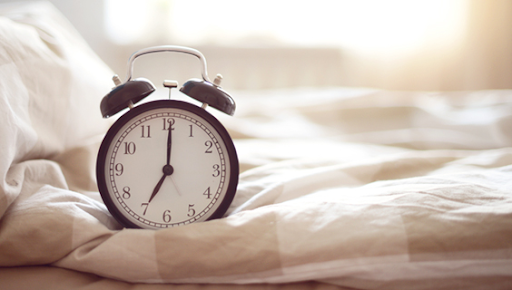
- Getting enough sleep is critical for a child to be successful in school. Children who do not get enough sleep have difficulty concentrating and learning as well as they can.
- Set a consistent bedtime for your child and stick with it every night. Having a bedtime routine that is consistent will help your child settle down and fall asleep. Components of a calming pre-bedtime routine may involve a bath/shower, reading with them, and tucking them in and saying good-night to them.
- Have your child turn off electronic devices well before bedtime.
- Try to have the home as quiet and calm as possible when younger children are trying to fall asleep.
- Insufficient sleep is associated with lower academic achievement in middle school, high school and college, as well as higher rates of absenteeism and tardiness. The optimal amount of sleep for most younger children is 10-12 hours per night and for adolescents (13-18 year of age) is in the range of 8-10 hours per night .
How Much Sleep Do I Need?
Note that falling asleep as soon as one's head hits the pillow is not proof that one is a good sleeper. It's more likely an indication that an individual is sleep deprived. In general, it should take about 10 to 20 minutes for a person to drift off. But whether it takes 20 minutes or 45, if one perceives that it is taking too long, that becomes one's reality, as it spurs anxiety about sleep.The National Sleep Foundation provides these daily sleep guidelines:
-
Infants (4-11 months): 12-15 hours
-
School age children (6-13): 9-11 hours
-
Teenagers (14-17): 8-10 hours
-
Young adults (18-25): 7-9 hours
-
Adults (26-64): 7-9 hours
-
Older adults (65+): 7-8 hours
Recipe for Sleep
Sound
Random bumps in the night or street noises can keep you from your rest, so consider wearing earplugs or using white noise to block distractions. Make sure your phone is on silent so you aren’t woken up by a random, unimportant notification at 2am.
Light
The darker your room can be, the more restful your sleep. So block out streetlight, and consider dimming the lights of your room an hour or so before your bedtime. If you’re looking at a computer or phone screen right before bed, you might be reducing the levels of melatonin in your body, a hormone you need to sleep soundly.
Temperature
A lower body temperature is an essential ingredient for sleep. A hot shower or bath right before bedtime can help rapidly lower your temperature and relax your mind and body. Keep your room cool, and try sticking a foot or a leg out from under the blankets to lower your body temperature. You might be surprised how quickly it can get to you sleep.
Create a Sleep Routine
Consistency is key when it comes to sleeping. If your schedule allows, try to go to bed and wake up at the same times each day, even on the weekends. If might feel majestic to stay in bed until noon on a Saturday, but it will probably leave you feeling more tired when Monday rolls around. You also can train your mind and body to remember when it’s time to sleep if you have bedtime habits. Reading a good book, taking a shower, and laying out clothes for the next day can prepare your body to slow down and prepare for sleep mode.
Don’t Fight
If you can’t fall asleep, don’t make yourself panic by staring at your clock. Get up and focus your mind on something other than how many hours of potential sleep you have left. Read a few more pages in your book, or listen to a podcast or some music. Think about a funny TV show or a story that makes you smile. Don’t go through your to-do list the next day or focus on worries. If you mentally beat yourself up or lay staring at the ceiling, negative thoughts will accumulate and keep you wide awake.
Make Healthy Choices
What you put into your body impacts how you sleep. Try your best not to feel too full or too hungry right when you go to bed. Hydrate during the day, but limit beverages right before bed that lead to midnight trips to the bathroom. Avoid nicotine, alcohol, and caffeine right before bed as well. Exercising during the day can also help you sleep more soundly. Some people find that exercise right before bed can keep you up late, but others find that it helps them settle down.
Ask for Help
Professionals field questions daily from patients about sleep. So never hesitate to talk to your doctor or a mental health professional about recommendations for sleep. Considering tracking your sleep habits for a week and bring notes to your next appointment. Often people can get caught up talking about other physical symptoms, and forget to mention their sleepless nights to health care professionals.When you start applying to sleep strategies for your life, don’t forget that it takes a while for your body to catch up to your mind. You might start a routine and make some adjustments, but then find that it takes a while to get those eight hours a night you’ve been craving. Be patient, and don’t be afraid to ask for help if you need it. You’ve got a lot of sleeping left to do in your life. Have faith that the right changes can make healthy sleep a reality and not just a dream.
Why aren’t kids getting enough sleep?
Sleep problems are fairly common. In fact, 1 in 4 people experience sleep difficulties, which include trouble falling asleep, trouble staying asleep, early morning waking, sleeping too much, or restless or unsatisfying sleep. Getting a good night’s sleep can improve your mental well-being and help you to better manage your anxiety. The good news is that there are things you can do to improve your sleep.
